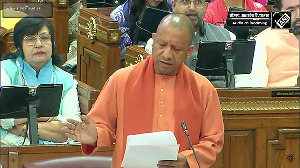Garry Kasparov was held to a draw by computer Deep Junior after the software programme made a speculative bishop sacrifice in Wednesday's fifth game of their six-game match in New York.
Now they both have 2-1/2 points each with everything to play for in Friday's final game of the contest billed the 'International Chess Federation's Man vs Machine' world championship.
"The last game is very difficult for a human. It is a great burden on my shoulders," said Kasparov, who holds the world No 1 ranking. He lost a match to the IBM supercomputer Deep Blue six years ago and is in an identical situation after Wednesday's game. "I hope I can do better than in '97," he said.
Each side has won a game and there have been three draws. One point is awarded for a win and a half point for a draw.
In October, world champion Vladimir Kramnik tied his eight-game match against a German-built program called Deep Fritz in Bahrain.
The Russian grandmaster, playing with the white pieces and having the advantage of the first move, and Deep Junior opened relatively quietly. But on the computer's 10th turn, it gave up a bishop for a pawn in what chess experts watching the game at the New York Athletic Club described as an unusually speculative attack on the king by a machine.
Kasparov's king was sent scurrying up the board and, in a defensive posture, the former world champion decided to take a less risky course that resulted in the position being repeated three times, which is a draw under the rules of chess. Only 19 moves had been played in 90 minutes at the board.
The Israeli programmers of Deep Junior, a software program that can run on a general purpose PC and calculates 3 million positions a second, said the computer's analysis showed Kasparov had made the best choice.
"Garry is the toughest and everything is really open," programmer Shay Bushinksy said of Friday's crucial game in the $1 million contest.
The winner will take home $300,000 and the loser $200,000. Each side will be awarded $250,000 if the match ends in a tie. Kasparov is also being paid a $500,000 appearance fee.
Kasparov, as he vowed six years ago, has thrown out his cautious 'anti-computer' strategy for bold, aggressive formations.
Experts say that allowing complications when lots of pieces are on the board favours the machine's calculating powers. Computer programmes such as Deep Junior playing at the level of a grandmaster instantly punish every human mistake.








 © 2025
© 2025